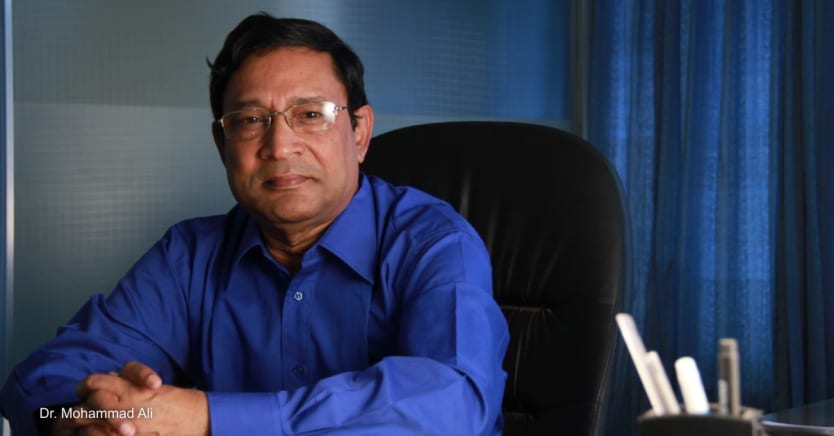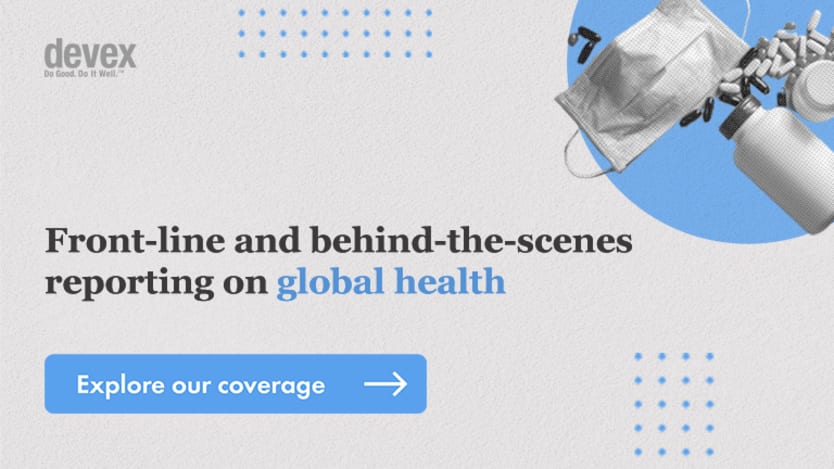
Dr. Mohammad Ali, a liver surgeon from Dhaka, has been working to raise awareness about and reduce the transmission of viral hepatitis in Bangladesh for over two decades. He said is worried about the impact of the coronavirus pandemic on hepatitis elimination, but his decades of work on preventing the condition also offer some fundamental insights for the COVID-19 response.
Ali has placed significant emphasis on testing, protecting health workers, and educating patients as critical parts of eliminating hepatitis.
“The most important target group is the patient. If a patient is not fully aware how hepatitis B or C is transmitted to others, he will go on transmitting [the infection],” he told Devex.
“I am very much afraid that whatever we have gained [in working to eliminate hepatitis] … may be lost.”
— Dr. Mohammad Ali, founder, National Liver Foundation of BangladeshIf a man came to him for hepatitis, Ali would tell him about how the disease spreads and encourage him to have family members tested for the condition, too.
“If I don't talk, one day he will die. After one year, his wife will die. After a few days or one after another, their children will die,” said Ali, who argued that the same can be said of the current COVID-19 response.
“Similarly, COVID-19-infected persons [need] to be tested and treated promptly and adequately. Otherwise, not only they will suffer or die [on a] large scale but also infect others, like close contacts, family members, and society at large,” he said.
Sign up for Devex CheckUp
The must-read weekly newsletter for exclusive global health news and insider insights.
Ali was recognized as one of six hepatitis “elimination champions” last month. The award, launched in 2019 by the Coalition for Global Hepatitis Elimination, recognizes individuals who’ve made significant contributions toward ending the condition globally.
But even before becoming an elimination champion, he was already known for leading the first successful liver transplant in Bangladesh in 2010. And in the hepatitis community, he is known for his grassroots work on prevention.
“What strikes me in particular is his passion for reaching the most vulnerable, particularly [Rohingya] refugees … and also as a clinician his vision to understand the importance of empowering patients with education,” wrote Lindsey Hiebert, associate director at the coalition.
The real burden of hepatitis is unknown in Bangladesh. There has been no national survey on the condition domestically, and current estimates of prevalence within the population — 5.5% and 1% for hepatitis B and C, respectively — are mostly based on small studies, Ali said.
But these viral infections are leading causes of liver cirrhosis and liver cancer, which are among the top 10 causes of mortality in Bangladesh, Ali said. But most of the time, they remain undiagnosed and untreated in the population.
Prevention first
Through the National Liver Foundation of Bangladesh, a nonprofit organization he founded in 1999, Ali has focused on raising awareness about liver diseases, as well as their prevention and treatment.
The foundation was a product of his visits to rural villages in the country, where he found people without much knowledge of hepatitis and unaware they already had the infection. When they experienced symptoms, they would look for traditional treatments such as herbal medicines. And by the time they sought medical help, they may have already developed liver cancer or cirrhosis.
While it’s hard to quantify how much the foundation’s work has improved the situation on the ground, Ali said the evidence is in interactions with patients. One of the things it has been trying to do, for instance, is prevent mother-to-child transmission by raising awareness about hepatitis B testing for pregnant women.
When will Rohingya refugees be vaccinated?
Despite promises from the government and the World bank, COVID-19 vaccines are yet to reach Rohingyas in Bangladesh. Health workers are also concerned about counterproductive consequences of tightly enforced restrictions.
Today, expectant mothers often travel to the foundation’s clinic to be screened for the virus and learn about preventing transmission to their babies. This is evidence that pregnant women are now aware of hepatitis and its complications, according to Ali.
His advocacy has reached vulnerable populations in Bangladesh, including Rohingya refugees, and Ali said he is most passionate about hepatitis awareness and prevention.
In recent decades, he brought together a team of experts and, working with local governments, conducted awareness campaigns in different districts. They educated people about hepatitis and provided free screenings and vaccination to orphaned children, as well as free treatment for young, underprivileged patients with hepatitis B or C. He also conducted patient conferences and seminars for medical students, encouraging them to get screened for hepatitis.
“I tell them, ‘You are the future doctors of this nation, and you will have the responsibility of treating people [for hepatitis], but you must be protected first,’” he said.
In Cox’s Bazar — the site of the world’s largest refugee camp — his foundation worked with camp authorities to conduct awareness campaigns and free hepatitis testing, revealing a high incidence of hepatitis C among refugees.
“We informed the concerned authorities to take active steps for this alarming situation. This high prevalence of hepatitis C is not only a serious concern for the refugees but also for the host country,” he said, noting how this same approach could be taken to prevent the spread of COVID-19 in camps.
An uncertain future
With COVID-19 disrupting most health services and limiting on-the-ground work in Bangladesh — which is currently seeing a surge in coronavirus cases and deaths — Ali is continuing his health advocacy through the use of digital technology, social media, and messaging apps.
But he said he worries about how the prolonged pandemic may impact the progress made so far on eliminating hepatitis domestically.
“I am very much afraid that whatever we have gained … may be lost,” he said.
“If the COVID pandemic continues for a long time, whether we’ll be successful [in achieving hepatitis] elimination in 2030 really is a problem.”

